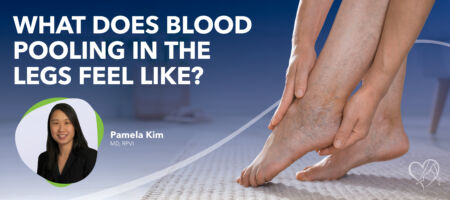
Medically reviewed by Pamela Kim, MD, RPVI, on August 26, 2025
Most people know the feeling of “tired legs” after a long day. But what if that heaviness, swelling, or aching doesn’t go away? You may think it’s just everyday fatigue, but blood pooling in the legs is your body’s way of warning you that the valves in your veins aren’t working as they should. This condition, known as venous insufficiency, is both common and treatable—but it should never be ignored.
For this article, we consulted Center for Vein Restoration (CVR) vein expert Dr. Pamela Kim. She is the lead physician at CVR locations in Framingham, Massachusetts, and Woburn, Massachusetts.
📅To schedule an appointment with Dr. Kim in Framingham, MA, CLICK HERE
📅To schedule an appointment with Dr. Kim in Woburn, MA, CLICK HERE
📅To schedule an appointment at any of CVR’s 120+ vein clinics nationwide, CLICK HERE
Now, let’s explore what blood pooling feels like, why it happens, and when to seek care from a board-certified vein specialist.
When blood doesn’t flow properly back to the heart, it begins to collect, or “pool,” in the lower legs. This leads to several noticeable symptoms:
At first, symptoms may seem mild and may come and go. But over time, vein problems can progress and interfere with daily life.
Left untreated, everyday activities become harder and can affect overall health as the disease worsens. Vein issues can disrupt sleep, reduce work performance, and limit physical activity, creating a vicious cycle of fatigue and declining fitness.
Don’t Wait! Vein Problems Only Get Worse
Blood pooling, restless legs, and varicose veins aren’t just cosmetic issues—they’re signs of venous insufficiency. At CVR, America’s largest physician-led vein center, you’ll receive care from nationally recognized specialists who set the standard in vein treatment.
Call 240-965-3915 or click below ⬇️to book your appointment before symptoms progress.

Healthy veins have one-way valves that keep blood moving upward toward the heart. As reported by the Cleveland Clinic, if these valves weaken or are damaged, blood slips backward and collects in the lower legs, increasing pressure in the veins. Vein experts call this venous hypertension.
Several factors increase the risk of valve failure and blood pooling:
Understanding what causes varicose veins and venous insufficiency is the first step toward preventing complications.
Are you at risk of venous insufficiency? Call a helpful Center for Vein Restoration Representative to discuss your concern, or schedule an appointment with a CVR vein physician today using the links below:
📞 Call CVR Patient Services Representative at 240-965-3915
📅 Or book online HERE
Mild swelling and heaviness might not sound serious, but blood pooling is a progressive condition. Without treatment, it can lead to:
The takeaway: blood pooling isn’t just uncomfortable. It can seriously affect long-term health if your varicose veins are ignored.
You don’t need to panic at the first sign of swelling—but if symptoms are consistent or worsening, it’s time to consult a Center for Vein Restoration vein specialist. Seek care if you notice:
A visit to a Center for Vein Restoration vein center usually begins with a physical exam and a duplex ultrasound, which uses sound waves to check for venous insufficiency. From there, your CVR vein expert will recommend a personalized treatment plan.

Expert Vein Care You Can Trust, Wherever You Are
With 80+ board-certified vein doctors serving patients at more than 120 locations nationwide, Center for Vein Restoration brings world-class vein care right to your community. From minimally invasive treatments to affordable insurance-covered care, we make it easy to reclaim your health.
👉Schedule your visit today and experience why patients nationwide trust Center for Vein Restoration.
The good news: vein treatment today is safe, effective, and minimally invasive. Options may include:
With proper care, most patients return to their normal activities within a day. Best of all, medically necessary vein treatment is covered by insurance. CVR accepts many insurances, including Aetna, Amerigroup, Anthem, Blue Cross/Blue Shield, Cigna, MultiPlan, Medicaid, Medicare, and more.
Restore Comfort and Confidence Today
Why keep living with leg pain, swelling, or varicose veins when relief is closer than you think? At Center for Vein Restoration, board-certified vein doctors deliver safe, effective treatments at more than 120 clinics nationwide. Take the first step toward healthier legs—schedule your consultation today!
Even if you don’t yet have symptoms, there are ways to protect your vein health:
These small habits can reduce the risk of venous insufficiency and support healthy circulation.
Blood pooling in the legs may feel like nothing more than tired, heavy legs at first. But it’s a sign that your veins are under strain and need attention. Left untreated, it can progress into more serious vein problems, including ulcers and clots.
The good news is that with today’s modern, minimally invasive vein treatments, you don’t have to live with the discomfort—or the risks. Your Center for Vein Restoration vein doctor can provide answers, relief, and long-term protection for your leg health.
Taking action now means restoring comfort, protecting your circulation, and keeping your legs healthy for years to come!
📞 Call Center for Vein Restoration at 240-965-3915
📅 Or book online HERE